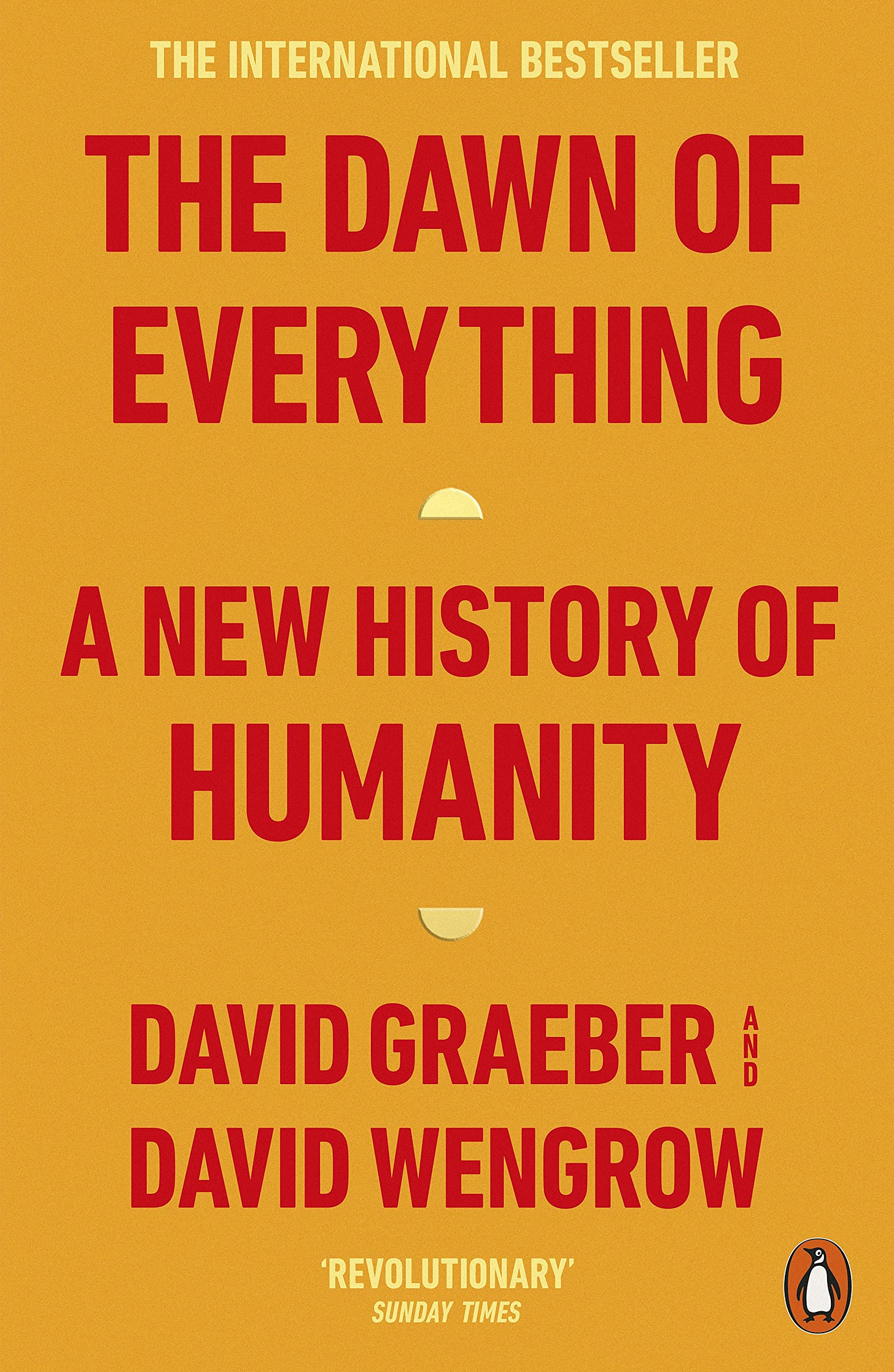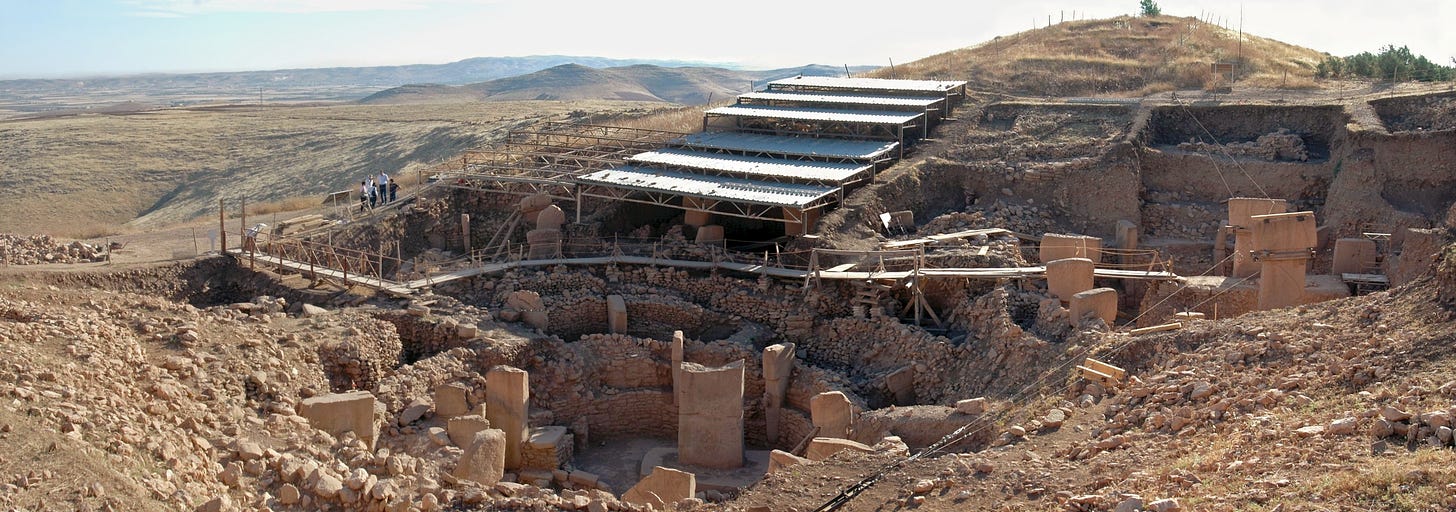Our book group has just read David Graeber and David Wengrow’s The Dawn of Everything. David Graeber, an anthropologist, wrote the very entertaining Bullshit Jobs: A Theory, and while an activist with Occupy Wall Street supposedly coined the slogan “We are the 99%”. He died soon after finishing this work. David Wengrow is an archaeologist. Their book is a huge-scale survey, sometimes romp, through human prehistory. It’s rare to read something so entertaining and erudite all at once.

Their most important idea is that societies make choices. In particular, when we see different social forms throughout history, we shouldn’t look for deterministic explanations. The economic base doesn’t determine the political superstructure. There’s no standard progress from small hunter-gatherer bands to stratified agricultural societies to modern states. Instead, people collectively choose how to organize themselves.
They argue that modern scholarship has a form of Eurocentric bias. We believe that ideas play a key role in forming modern Western societies, from Enlightenment liberalism, to socialism, fascism, social democracy, neoliberalism… well, we should extend that compliment to non-Western societies too. For example, while Yuval Noah Hariri thought of agriculture as immiserizing the population and leading inevitably to inequality, they speak of early agricultural societies as “playing” with agriculture, trying it out but concerned with its social effects. Or they argue that different Native American societies on the West coast faced very similar environments, but chose to organize themselves differently, partly because they defined themselves in opposition to their neighbours. Californians were modest, industrious “Protestants”; Northwest Coast fishers were a vainglorious, potlatching aristocracy.
A few things to get out of the way. First, almost every reviewer has pointed out that the authors speculate far in advance of the data.[1] True, but I’m inclined to cut them some slack. In one way, Dawn is a response to the emergence of a huge new data source: archeological discoveries in non-Western societies. Göbekli Tepe is there, which I had just about heard of, along with many others I hadn’t: Poverty Point, Mexican megacity Teotihuacan, and early Ukrainian proto-cities. When faced with a ton of new data, you need bold new hypotheses to make sense of it. So it’s fine not to have everything nailed down. I bet many of their hypotheses are false, but I also think that testing them might lead to a lot of interesting research.

Second, part of their argument is that Enlightenment thinkers were reacting to an “indigenous critique”, in which non-Western thinkers criticized the inequality and unfreeness of European societies. Their key witness is Kandiaronk, a native American chieftain who (maybe?) travelled to Europe and whose dialogues were recorded (or made up? You see the issue here) by a French baron. Kandiaronk sounds cool, but one controversial example doesn’t prove an argument. Besides, the debate here is not so important. We already knew that Enlightenment authors were fascinated by non-Western societies. Were indigenous people participants in a dialogue, or just objects of study? This is a question without a simple binary answer, and anyway it is not a big deal. Contemporary academics want very much to say that oppressed group X “had agency”, but not much actually hangs on whether they did or not; at best, this is a form of politeness to the dead, at worst a kind of self-congratulation.
But it does matter if societies collectively choose how to form themselves. It’s an idea that should be sympathetic to modern economists, who know about multiple equilibria. In particular, we understand how different political arrangements can be self-reinforcing. In France, the succession of rulers was determined by the Salic Law; in Tibet, by asking a small child to recognize the shoes of his previous incarnation. Both are equilibria: if everyone else go along with them, then you should too. And if there are multiple equilibria, then people might have debated which to pick. That seems natural. Students do it in economic experiments, and modern electorates do it during election campaigns — at least that is the ideal.
A couple of worries. First, when different groups in similar environments organize themselves differently, there are other explanations than choice. One is specialization. We fish, you hunt. Hunting and fishing need some level of group-wide coordination: young people must be taught these skills, hunting is done in groups, and so on. So then different societies specialize, but they needn’t consciously decide to. They may just drift down different paths. And trade between the societies would even encourage this.
Think about specialization more broadly. Dawn gives several examples of peaceful agriculturalists growing up next to aristocratic mountain bandits. Again, this needn’t be out of choice. Economists of anarchy can tell stories where people specialize as either producers, who make valuable goods, or bandits who steal from the producers:
The mountain sheep were sweeter
But the valley sheep were fatter
And so we deemed it meeter
To carry off the latter…
The incentives push different groups to do different things, even though they’re in the same environment. (Looked at another way, each group is part of the other group’s environment.) Of course, the long run story is that the bandits settle down, call themselves “kings” and become symbiotic with the producers, like bacteria colonizing the human gut. One interpretation of Dawn’s evidence is that this process took place very slowly, over thousands of years.
A deeper question. My idea of small-scale societies was that individually, people think, but collectively, they’re bound by tradition. That is, they don’t say “we are hunter-gatherers for reasons X, Y and Z”. Instead they explain it by myths or stories, or by saying “we’ve always done it this way”. Now, this was my very ill-informed stereotype, and maybe it’s completely wrong! Maybe people in these societies think just as explicitly as modern Westerners about their social arrangements.
But a very different anthropological book, Joe Henrich’s The Secret of Our Success, contains a story which has become kind of famous: the cassava cookery story. Preparing cassava root is hard. It requires numerous non-intuitive steps, and if you miss out these steps, you set yourself up for nasty long-run outcomes, like chronic cyanide poisoning. The societies which eat cassava know these steps, even though they do not know what cyanide is. They pass down a set of how-to traditions. If someone in this society were to say “hey, why are we doing it this way,” they would not receive a satisfactory answer. They might even decide — fatally — to skip the “pointless” steps. As Henrich puts it, traditions let people find solutions to problems which are cognitively opaque, where “individual learning does not pay… and intuitions are misleading”. That seems a good reason why we might not expect traditional societies to think explicitly about their social arrangements (or their cooking arrangements).
Or when they did, we might expect them to explicitly valorize tradition, because groups that didn’t, wouldn’t survive. Before the vast collective infrastructure of modern science, pre-modern societies are, if you like, perched on a mountaintop in the darkness. They know that they are safe where they are. They do not know what the effect of a single step will be.

Notably, the drive towards traditionalism might grow as societies grow larger. If you have an especially successful and complex social arrangement, which you do not possess explicit causal knowledge about, it becomes especially risky to change it. The higher the mountaintop, the steeper the fall. Interestingly, among the Romans, an Italian tribe who expanded to a world empire, the word new was something close to a swearword. “Ex Africa semper aliquid novum” – always something new out of Africa – was the opposite of the praise it sounds like today.
A last thought is that there’s a particular dearth of evidence in the book about how these collective choices are made. There’s one, questionably authentic, dialogue among the Tlaxcalteca, who chose to ally with Cortez against the Aztecs. Perhaps a useful strategy would be to look back at the earliest examples of social thought that we do have. Plato, after all, lived in a fairly primitive small society. The Old Testament contains the holy writings of a tribal group, and has plenty of politics and sociology — attacks on place-based religion, on sacrifice, on arrogant kings and on moral decay. The Hindu and Buddhist scriptures also think about social organization. A systematic study of this kind of work might help us to understand how people argued about collective choices in a variety of societies.
Anyway, this is a super book. Even if you disagree with all its ideas, it will introduce you to so many new worlds that your mind can’t help but be expanded.
- ^
Dawn has got positive reviews in the mainstream press. Useful academic reviews, i.e. by people who might be experts on the topic, are hard to find as yet, but here is an interesting critique by Walter Scheidel, the economic historian who wrote Escape from Rome.
I’d be very uneasy about any of the scholarship in a book that from your description (and I think at least one other review that I’ve read) just ignores reality on the Kandiaronk stuff, and some of the other things it discusses. If you know you can’t trust them on things they obviously get wrong, can you trust them on any of it? It seems much more likely that if you got experts to review the bits of the book relevant to their areas of expertise, the conclusion would be that a lot of it was worthless, actively misleading, or not even wrong.
Your description of the book makes me want to read it. It sounds fascinating, and stimulating. I just feel like I might learn more by reading a series of rebuttals of their arguments from people who know what they’re talking about.
The Scheidel review is worth reading, though it’s rather hurried. Their argument is quite complex and sometimes a bit fuzzy, and the book has a lot of detail; I think it’ll take some time for academics to chew through it and understand exactly what’s at stake.
Other academic reviews I’ve read haven’t been great—the typical stuff has been “how can they ignore [my narrow narrow subfield]”.